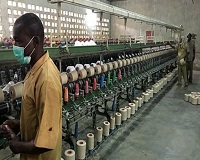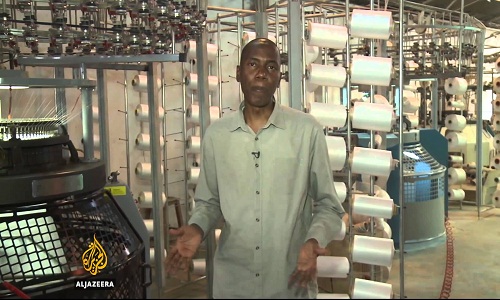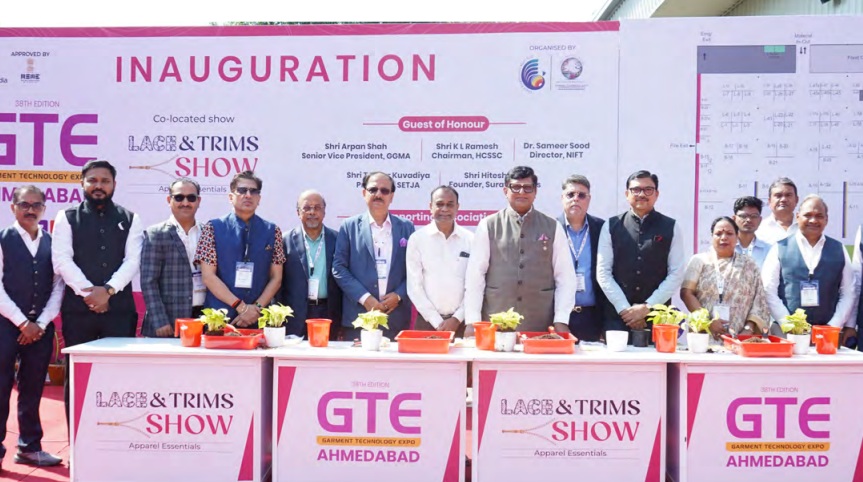"Before the inception of the Special Presidential Committee on the Resuscitation of the Cotton, Textile and Garment Industry, Nigeria’s textile sector, was in a dismal state. Factories in Lagos, Zaria, Kaduna and Kano were performing below production capacities. Employees had been maintained only because either the employers did not want to lose them or their parents had been active players in the sector. The machines, not being used, were covered with dust. Some factories had stocks untouched for ages, while others faced an acute shortage."
 Before the inception of the Special Presidential Committee on the Resuscitation of the Cotton, Textile and Garment Industry, Nigeria’s textile sector, was in a dismal state. Factories in Lagos, Zaria, Kaduna and Kano were performing below production capacities. Employees had been maintained only because either the employers did not want to lose them or their parents had been active players in the sector. The machines, not being used, were covered with dust. Some factories had stocks untouched for ages, while others faced an acute shortage.
Before the inception of the Special Presidential Committee on the Resuscitation of the Cotton, Textile and Garment Industry, Nigeria’s textile sector, was in a dismal state. Factories in Lagos, Zaria, Kaduna and Kano were performing below production capacities. Employees had been maintained only because either the employers did not want to lose them or their parents had been active players in the sector. The machines, not being used, were covered with dust. Some factories had stocks untouched for ages, while others faced an acute shortage.
Attempts to resuscitate the textile industry had failed as it was saddled or burdened with legacy issues. Apart from infrastructure challenges, high gas prices, diesel and insufficient supply of low fuel pour oil; issues of distrust and insincerity across the line, low patronage, inadequate quantity and quality for supplies, smuggling of fabrics and availability of cheaper options, etc also plague the industry.
New revival strategies
To drive the sustainable implementation of the Cotton, Textile and Garment (CTG) policy, as well as President Muhammadu Buhari’s policy thrust and vision in the textile industry, the government in April 2016 inaugurated a special Implementation Committee involving critical stakeholders. The Committee is responsible for overall revamping of the sector besides attracting investments across the value chain i.e. cotton farming, cotton processing, textile manufacturing and garmenting.
vision in the textile industry, the government in April 2016 inaugurated a special Implementation Committee involving critical stakeholders. The Committee is responsible for overall revamping of the sector besides attracting investments across the value chain i.e. cotton farming, cotton processing, textile manufacturing and garmenting.
Accordingly, the committee devised strategies to garner support for locally made fabrics. These included ascertaining quality and source of raw materials, identification of possible linkages of producers and end-users of locally produced fabrics and the development of the garment sub-sector for increased productivity.
Key challenges faced by industry
As per the committee, some of the key challenges affecting the sector include: lack of cotton lint, smuggling and counterfeiting, inadequate infrastructure, access to power, and funding. The committee was able to access working capital to enable manufacturers acquire necessary raw materials and other essential inputs for production activities. It also secured loan re-financing and recommended 60 per cent of forex allocation from CBN. However, complete overhaul of the industry requires around N500 million to N1 trillion. These funds have been hampered by the high interest rates charged on loans by financial institutions. The committee recommended the government should approve loans granted to the textile industries by the Bank of Industry. BOI should be takenover by the Central Bank with a view to extending the repayment tenor. Also, the accumulated 10 per cent of tariff on imported textile materials, for the development of local manufacturing sector in Nigeria, should be made available to the sector players without much further delay.
The Committee, in its bid to resolve the issue of high gas pricing, has secured a presidential approval for the re-categorisation of textile manufacturers as strategic industrial sector as against earlier classification in the “commercial sector.” The major implication of the policy shift is the elimination of the many bottle necks in the supply of energy to the textile mills. Once implemented, gas supply to textile manufacturers will cost only $3 per standard cubic feet as against the old regime of $8.45.
Other impediments hindering speed in the actualisation of the President Muhammadu Buhari’s blueprint of action in the textile sector include: un-abating phenomena of counterfeiting and smuggled textile materials especially from China. The Nigeria Customs Service and other security agencies will have to beef up vigilance in their statutory duty of checking influx of banned textile materials into the country.












